Sulfur Fertilizer Market
Sulfur Fertilizer Market Size and Share Forecast Outlook 2025 to 2035
Sulfur fertilizer market is projected to grow from USD 4.8 billion in 2025 to USD 6.6 billion by 2035, at a CAGR of 3.2%. Elemental Sulfur will dominate with a 45.0% market share, while row crops will lead the application segment with a 51.0% share.
Sulfur Fertilizer Market Forecast and Outlook 2025 to 2035
The global sulfur fertilizer market is valued at USD 4.8 billion in 2025. It is slated to reach USD 6.6 billion by 2035, recording an absolute increase of USD 1.8 billion over the forecast period. This translates into a total growth of 37.5%, with the market forecast to expand at a compound annual growth rate (CAGR) of 3.2% between 2025 and 2035.
The overall market size is expected to grow by nearly 1.38X during the same period, supported by increasing demand for crop nutrition enhancement, growing agricultural productivity requirements, and rising emphasis on sulfur-deficient soil treatment across diverse farming operations, agricultural regions, and crop production systems.
Quick Stats for Sulfur Fertilizer Market
- Sulfur Fertilizer Market Value (2025): USD 4.8 billion
- Sulfur Fertilizer Market Forecast Value (2035): USD 6.6 billion
- Sulfur Fertilizer Market Forecast CAGR: 3.2%
- Leading Type in Sulfur Fertilizer Market: Elemental sulfur
- Key Growth Regions in Sulfur Fertilizer Market: North America, Europe, and Asia Pacific
- Key Players in Sulfur Fertilizer Market: Yara, Nutrien, Mosaic, EuroChem, ICL, OCI
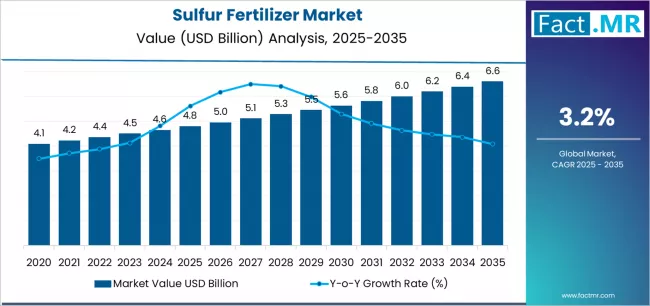
The growth of the global sulfur fertilizer market is being driven by a combination of agronomic, environmental, and economic factors. Sulfur is an essential secondary nutrient required for optimal plant growth, protein synthesis, and enzymatic activity, making it critical for crops such as cereals, oilseeds, pulses, and vegetables. Increasing soil sulfur deficiencies, exacerbated by intensive farming practices, reduced atmospheric deposition, and declining organic matter levels, are intensifying the need for supplemental sulfur fertilization. This has prompted farmers worldwide to adopt sulfur-containing fertilizers, including ammonium sulfate, potassium sulfate, calcium sulfate, and elemental sulfur, to improve yield quality and quantity.
Technological advancements in fertilizer formulations are further supporting market expansion. Enhanced-efficiency sulfur fertilizers, slow-release formulations, and granulated or coated products enable more precise nutrient delivery, reduce leaching losses, and improve nutrient use efficiency. Integration with blended NPK fertilizers is also becoming common, allowing farmers to apply a balanced nutrient package in a single operation, improving labor efficiency and reducing operational costs.
Regionally, Asia-Pacific dominates the sulfur fertilizer market due to the prevalence of high-intensity agriculture, large arable land areas, and government initiatives promoting soil nutrient management. India and China, in particular, are witnessing strong adoption driven by increasing demand for high-yield cereals and oilseed crops. North America and Europe represent mature markets with steady growth, supported by advanced agricultural practices, precision farming adoption, and regulatory frameworks encouraging sustainable fertilization. Latin America and Africa are emerging markets where expansion is fueled by commercial farming investments, soil rehabilitation programs, and rising awareness of crop nutrient management.
Environmental sustainability considerations are also shaping market dynamics. Efficient sulfur application helps reduce nitrogen requirement and associated greenhouse gas emissions, aligning with global sustainable agriculture goals. Market participants are increasingly investing in research and development to produce cost-effective, environmentally friendly formulations that enhance soil health and crop performance.
Strategic initiatives, including mergers, acquisitions, and partnerships between fertilizer manufacturers and agricultural solution providers, are strengthening supply chains and expanding regional reach. By 2035, the sulfur fertilizer market is expected to evolve into a technologically integrated, efficiency-driven ecosystem, supporting global food security, improved crop quality, and sustainable farming practices while addressing soil nutrient deficiencies across diverse agricultural landscapes.
Between 2025 and 2030, the sulfur fertilizer market is projected to expand from USD 4.8 billion to USD 5.6 billion, resulting in a value increase of USD 0.8 billion, which represents 44.4% of the total forecast growth for the decade. This phase of development will be shaped by increasing sulfur deficiency in agricultural soils and crop nutrition awareness, rising adoption of precision agriculture technologies, and growing demand for enhanced crop yield solutions in agricultural and farming applications. Agricultural input manufacturers and farming operations are expanding their sulfur fertilizer capabilities to address the growing demand for effective and sustainable crop nutrition solutions that ensure agricultural productivity and soil health optimization.
Sulfur Fertilizer Market Key Takeaways
| Metric | Value |
|---|---|
| Estimated Value in (2025E) | USD 4.8 billion |
| Forecast Value in (2035F) | USD 6.6 billion |
| Forecast CAGR (2025 to 2035) | 3.2% |
From 2030 to 2035, the market is forecast to grow from USD 5.6 billion to USD 6.6 billion, adding another USD 1.0 billion, which constitutes 55.6% of the overall ten-year expansion. This period is expected to be characterized by the expansion of precision agriculture systems and sustainable farming technologies, the development of next-generation fertilizer technologies, and the growth of specialized applications in organic farming and precision crop nutrition. The growing adoption of sustainable agriculture practices and environmental stewardship strategies will drive demand for sulfur fertilizers with enhanced efficiency and eco-friendly application capabilities.
Between 2020 and 2025, the sulfur fertilizer market experienced steady growth from USD 3.6 billion to USD 4.8 billion, driven by increasing agricultural productivity requirements and growing recognition of sulfur nutrition as essential input for enhancing crop yields and providing comprehensive plant nutrition in diverse agricultural and farming applications. The market developed as farmers and agricultural professionals recognized the potential for sulfur fertilizer technology to enhance crop quality, improve soil health, and support sustainable farming objectives while meeting agricultural productivity requirements. Technological advancement in fertilizer formulations and application systems began emphasizing the critical importance of maintaining nutritional effectiveness and environmental sustainability in challenging agricultural environments.
Why is the Sulfur Fertilizer Market Growing?
Market expansion is being supported by the increasing sulfur deficiency in agricultural soils and crop nutrition requirements driven by intensive farming practices and soil depletion, alongside the corresponding demand for specialized fertilizer products that can enhance crop nutrition, enable effective soil treatment, and maintain agricultural productivity across various farming operations, agricultural regions, crop production systems, and agricultural service centers. Modern farmers and agricultural professionals are increasingly focused on implementing sulfur fertilizer solutions that can improve crop yields, enhance soil health, and provide consistent performance in demanding agricultural conditions.
The growing emphasis on sustainable agriculture and crop quality is driving demand for sulfur fertilizers that can support precision farming initiatives, enable efficient nutrient management, and ensure comprehensive agricultural effectiveness. Agricultural input industry manufacturers' preference for integrated nutrition platforms that combine crop enhancement with environmental sustainability and application efficiency is creating opportunities for innovative sulfur fertilizer implementations. The rising influence of agricultural productivity metrics and sustainability requirements is also contributing to increased adoption of sulfur fertilizers that can provide superior crop outcomes without compromising environmental standards or soil health.
Segmental Analysis
The market is segmented by type, application, and form. By type, the market is divided into elemental sulfur, sulfate fertilizers, and sulfur-coated urea & specialty. Based on application, the market is categorized into row crops, horticulture & specialty crops, and turf & ornamentals. By form, the market is split between solid/granular, liquid solutions, and coated/slow-release.
By Type, the Elemental Sulfur Segment Leads the Market
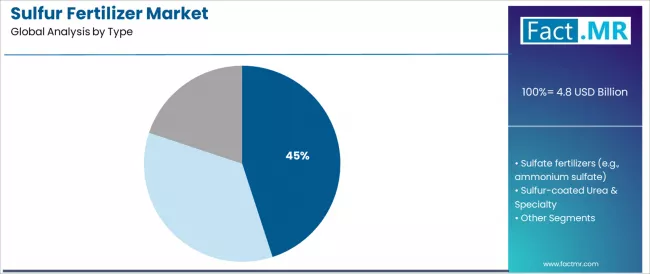
The elemental sulfur type segment is projected to maintain its leading position in the sulfur fertilizer market in 2025 with a 45.0% market share, reaffirming its role as the preferred technology for effective soil sulfur supplementation and comprehensive crop nutrition operations.
Farmers and agricultural professionals increasingly utilize elemental sulfur for their superior soil conditioning capabilities, excellent long-term availability, and proven effectiveness in sulfur nutrition across various crop types while maintaining application efficiency and cost-effectiveness. Elemental sulfur technology's proven effectiveness and nutritional versatility directly address the agricultural requirements for sustained sulfur release and reliable crop nutrition outcomes across diverse farming applications and operational settings.
This type segment forms the foundation of modern agricultural nutrition, as it represents the technology with the greatest contribution to sustainable sulfur nutrition and established agricultural record across multiple farming applications and crop protocols.
Agricultural input industry investments in advanced fertilizer technologies continue to strengthen adoption among farmers and agricultural professionals. With increasing demand for sustainable nutrition solutions and proven agricultural capabilities, elemental sulfur fertilizers align with both agricultural objectives and sustainability requirements, making them the central component of comprehensive crop nutrition strategies.
By Application, the Row Crops Segment Dominates Market Demand
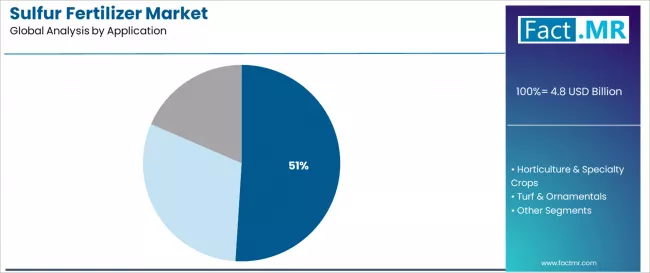
The row crops application segment is projected to represent the largest share of sulfur fertilizer applications in 2025 with a 51.0% market share, underscoring its critical role as the primary application for fertilizer use across agricultural operations, farming systems, and crop production facilities.
Agricultural operators prefer row crops applications for sulfur fertilization due to their exceptional scale requirements, comprehensive nutrition needs, and ability to support large-scale operations while maintaining agricultural standards and productivity objectives. Positioned as essential fertilizer application for modern agricultural operations, sulfur fertilizers in row crop applications offer both nutrition advantages and economic benefits.
The segment is supported by continuous innovation in agricultural technology and the growing availability of integrated crop management platforms that enable superior nutrition performance with enhanced efficiency and improved agricultural coordination. Additionally, agricultural operations are investing in comprehensive nutrition programs to support increasingly demanding agricultural standards and productivity requirements for effective and continuous crop nutrition.
As agricultural nutrition standards advance and efficiency requirements increase, the row crops segment will continue to dominate the market while supporting advanced sulfur fertilizer utilization and agricultural optimization strategies.
By Form, the Solid/Granular Segment Commands Market Leadership
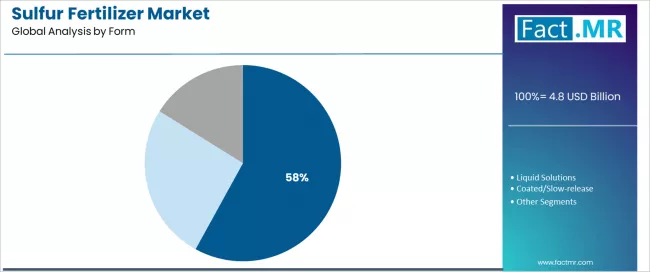
The solid/granular form segment is projected to maintain the largest share of sulfur fertilizer formulations in 2025 with a 58.0% market share, highlighting its fundamental role in application convenience, storage efficiency, and agricultural optimization.
Agricultural operators prefer solid/granular forms for their comprehensive handling benefits, application flexibility, and proven effectiveness in supporting various agricultural requirements with superior convenience profiles and consistent application outcomes. This segment represents the backbone of sulfur fertilizer forms across multiple agricultural settings and application protocols.
The solid/granular segment benefits from ongoing technological advancement in fertilizer formulation and the expanding adoption of convenience-focused operations in critical agricultural applications.
Solid/granular demand continues to grow due to increasing application convenience requirements, rising handling efficiency needs, and the requirement for fertilizer forms that can support diverse application methods while maintaining effectiveness.
As agricultural operations become more efficiency-focused and convenience requirements increase, the solid/granular segment will continue to drive market growth while supporting advanced sulfur fertilizer applications and agricultural optimization strategies.
What are the Drivers, Restraints, and Key Trends of the Sulfur Fertilizer Market?
The sulfur fertilizer market is advancing steadily due to increasing sulfur deficiency in agricultural soils and crop nutrition requirements driven by intensive farming practices and soil depletion, growing adoption of precision agriculture technologies that require specialized fertilizer products providing enhanced crop nutrition and soil health effectiveness across diverse farming operations, agricultural regions, crop production systems, and agricultural service centers. However, the market faces challenges, including fluctuating sulfur raw material prices and supply chain complexities, regulatory compliance requirements for fertilizer applications, and competition from alternative nutrition sources and organic farming methods. Innovation in precision application systems and sustainable fertilizer formulations continues to influence product development and market expansion patterns.
Expansion of Precision Agriculture and Smart Farming Technologies
The growing adoption of precision agriculture approaches is driving demand for specialized fertilizer products that address targeted nutrition requirements including variable rate application, improved nutrient efficiency, and enhanced crop response in agricultural and farming settings. Precision agriculture applications require advanced sulfur fertilizers that deliver superior targeted performance across multiple crop parameters while maintaining reliability and agricultural effectiveness. Agricultural operators are increasingly recognizing the competitive advantages of precision fertilizer integration for productivity enhancement and resource optimization, creating opportunities for innovative technologies specifically designed for next-generation smart farming operations.
Integration of Sustainable Formulations and Environmental Technologies
Modern agricultural operators are incorporating sustainable fertilizer formulations and environmental technologies to enhance crop nutrition precision, address soil health requirements, and support comprehensive sustainability objectives through optimized nutrition systems and intelligent agricultural management. Leading companies are developing sustainable platforms, implementing environmental enhancement systems, and advancing eco-friendly sulfur fertilizers that maximize agricultural effectiveness while supporting environmental stewardship approaches. These technologies improve agricultural outcomes while enabling new market opportunities, including sustainable agriculture applications, precision nutrition systems, and environmentally responsible farming.
Development of Next-Generation Application and Efficiency Technologies
The expansion of advanced application systems, efficiency technologies, and intelligent fertilizer capabilities is driving demand for sulfur fertilizers with enhanced effectiveness and specialized agricultural capabilities. These advanced applications require specialized fertilizer platforms with precise nutrition control and exceptional agricultural reliability that exceed traditional farming requirements, creating premium market segments with differentiated agricultural propositions. Manufacturers are investing in advanced application capabilities and efficiency system development to serve emerging agricultural applications while supporting innovation in advanced fertilizer products and sustainable agriculture sectors.
Analysis of the Sulfur Fertilizer Market by Key Countries
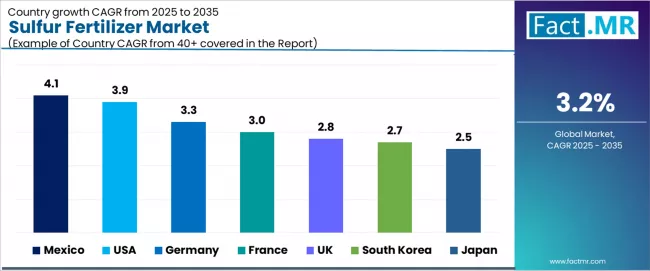
| Country | CAGR (2025-2035) |
|---|---|
| USA | 3.9% |
| Mexico | 4.1% |
| Germany | 3.3% |
| France | 3.0% |
| UK | 2.8% |
| South Korea | 2.7% |
| Japan | 2.5% |
The sulfur fertilizer market is experiencing solid growth globally, with Mexico leading at a 4.1% CAGR through 2035, followed closely by the USA at 3.9%, driven by expanding agricultural production and growing crop nutrition requirements, alongside increasing investment in precision agriculture technologies and sustainable farming initiatives. Germany shows growth at 3.3%, emphasizing agricultural technology innovation, crop nutrition excellence, and sustainable farming development.
France demonstrates 3.0% growth, supported by agricultural system advancement and fertilizer technology adoption. The UK records 2.8%, focusing on agricultural innovation and fertilizer technology development. South Korea exhibits 2.7% growth, emphasizing agricultural modernization and crop nutrition applications. Japan shows 2.5% growth, emphasizing quality standards and specialized agricultural applications.
The report covers an in-depth analysis of 40+ countries; seven top-performing countries are highlighted below.
Mexico Leads Global Market Growth with Agricultural Development and Farming Advancement
Revenue from sulfur fertilizers in Mexico is projected to exhibit strong growth with a CAGR of 4.1% through 2035, driven by expanding agricultural development and rapidly growing crop nutrition sector supported by increasing agricultural productivity requirements and advanced farming technology adoption.
The country's substantial agricultural system and increasing investment in crop nutrition technologies are creating substantial demand for sulfur fertilizer solutions. Major agricultural input manufacturers and farming operations are establishing comprehensive sulfur fertilizer capabilities to serve both domestic markets and export opportunities.
- Strong agricultural expansion and growing crop nutrition requirements are driving demand for sulfur fertilizers throughout major farming regions including central Mexico, Bajío, and agricultural development corridors, supporting both large-scale operations and specialty crop production.
- Growing agricultural modernization and productivity enhancement initiatives are supporting the rapid adoption of sulfur fertilizer technologies among farmers seeking enhanced crop nutrition capabilities and agricultural excellence in competitive global markets.
USA Demonstrates Agricultural Integration with Farming Infrastructure Development
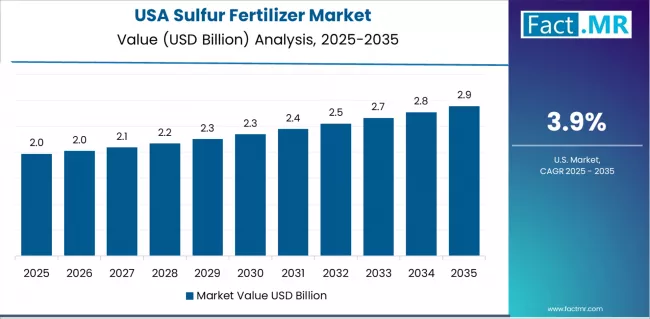
Revenue from sulfur fertilizers in the USA is expanding at a CAGR of 3.9%, supported by agricultural modernization initiatives, growing farming infrastructure, and strategic position as an agricultural production hub for global markets.
The USA's agricultural development and fertilizer technology advancement are driving sophisticated sulfur fertilizer capabilities throughout farming sectors. Leading agricultural operators and fertilizer companies are establishing extensive operational facilities to address growing domestic agricultural and international market demand.
- Agricultural modernization and expanding farming infrastructure are creating opportunities for sulfur fertilizer adoption across farming operations, agricultural regions, and crop production systems in major agricultural areas including the Corn Belt, Great Plains, and agricultural development zones.
- Growing agricultural sector and fertilizer technology expansion are supporting the adoption of advanced farming technologies among operators seeking to serve both domestic and international markets while maintaining agricultural standards and productivity effectiveness.
Germany Demonstrates Agricultural Technology Excellence with Crop Nutrition Innovation
Revenue from sulfur fertilizers in Germany is expanding at a CAGR of 3.3%, driven by the country's agricultural technology leadership, crop nutrition innovation capabilities, and precision farming excellence supporting high-performance sulfur fertilizer applications.
Germany's agricultural expertise and fertilizer technology innovation are driving demand for specialized sulfur fertilizer solutions throughout farming sectors. Leading fertilizer manufacturers and agricultural operators are establishing comprehensive innovation programs for next-generation agricultural technologies.
- Advanced agricultural technology development and crop nutrition innovation requirements are creating demand for specialized sulfur fertilizers among farmers and fertilizer companies seeking enhanced agricultural performance and reliability in competitive European markets.
- Strong agricultural industry expertise and fertilizer technology leadership are supporting the adoption of advanced sulfur fertilizer technologies and operational optimization across farming facilities throughout major agricultural regions including Bavaria and North Rhine-Westphalia.
France Shows Agricultural Excellence and Fertilizer Technology Innovation Leadership
Revenue from sulfur fertilizers in France is expanding at a CAGR of 3.0%, supported by the country's agricultural system excellence, fertilizer technology innovation leadership, and pioneering farming advancement initiatives including sustainable agriculture and precision crop nutrition development.
France's agricultural heritage and fertilizer expertise are supporting investment in advanced sulfur fertilizer technologies. Major agricultural operators and fertilizer technology companies are establishing comprehensive operational programs incorporating sulfur fertilizer advancement and agricultural innovation.
- Advanced agricultural innovation and fertilizer technology capabilities are creating demand for premium sulfur fertilizer products supporting operational excellence, agricultural advancement, and crop nutrition optimization throughout major agricultural and technology regions.
- Strong agricultural focus and fertilizer technology leadership are driving the adoption of advanced agricultural technologies and operational enhancement throughout farming facilities across agricultural excellence clusters and innovation zones.
UK Focuses on Agricultural Innovation and Fertilizer Technology Development
Revenue from sulfur fertilizers in the UK is growing at a CAGR of 2.8%, driven by the country's agricultural innovation, fertilizer technology development initiatives, and emphasis on advanced farming solutions for commercial and specialty applications.
The UK's agricultural research excellence and operational commitments are supporting investment in advanced sulfur fertilizer technologies. Major agricultural operators and fertilizer technology companies are establishing comprehensive operational programs incorporating advanced sulfur fertilizer configurations.
- Agricultural innovation and fertilizer development requirements are creating demand for high-performance sulfur fertilizers supporting agricultural advancement, operational innovation, and crop nutrition optimization throughout major agricultural and technology regions.
- Strong research capabilities and agricultural mandates are driving the adoption of advanced fertilizer technologies and operational enhancement supporting superior agricultural performance and operational leadership in competitive global markets.
South Korea Demonstrates Agricultural Leadership with Fertilizer Technology Focus
Revenue from sulfur fertilizers in South Korea is expanding at a CAGR of 2.7%, supported by the country's agricultural modernization, fertilizer technology expertise, and strong emphasis on advanced farming solutions for comprehensive commercial and specialty applications.
South Korea's agricultural sophistication and operational innovation focus are driving sophisticated sulfur fertilizer capabilities throughout farming sectors. Leading agricultural operators and fertilizer technology companies are investing extensively in advanced agricultural technologies.
- Advanced agricultural development and fertilizer technology innovation are creating demand for specialized sulfur fertilizer products throughout farming applications, agricultural systems, and operational facilities in major agricultural regions including agricultural innovation zones around major cities.
- Strong agricultural industry and operational expertise are supporting the adoption of innovative fertilizer technologies and operational optimization for next-generation applications requiring superior crop nutrition performance and agricultural excellence.
Japan Shows Quality Excellence Focus with Specialized Agricultural Applications
Revenue from sulfur fertilizers in Japan is expanding at a CAGR of 2.5%, supported by the country's quality excellence standards, specialized agricultural capabilities, and strong emphasis on high-specification fertilizer technologies for advanced commercial and specialty farming sectors.
Japan's quality sophistication and agricultural excellence are driving demand for premium sulfur fertilizer products. Leading agricultural operators and fertilizer technology companies are investing in specialized capabilities for advanced farming applications.
- Advanced agricultural processing and quality farming requirements are creating opportunities for high-quality sulfur fertilizer products throughout specialized agricultural production, fertilizer manufacturing, and operational applications meeting stringent quality and performance standards.
- Strong agricultural industry and operational sector are driving adoption of specialized sulfur fertilizer devices and advanced fertilizer technologies supporting innovation in agricultural operations, operational advancement, and farming sectors requiring superior operational performance and consistency.
Europe Market Split by Country
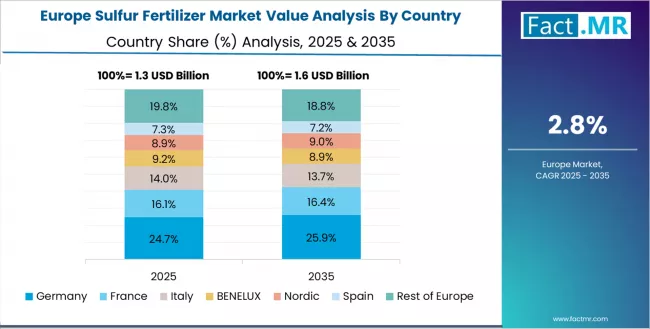
The sulfur fertilizer market in Europe is projected to grow from USD 1.44 billion in 2025 to USD 1.98 billion by 2035, registering a CAGR of 3.2% over the forecast period. Germany is expected to maintain its leadership position with a 24.7% market share in 2025, declining slightly to 24.3% by 2035, supported by its advanced agricultural technology industry and fertilizer innovation capabilities.
France follows with a 19.4% share in 2025, projected to reach 19.7% by 2035, driven by comprehensive agricultural development and fertilizer technology applications. The United Kingdom holds a 17.5% share in 2025, expected to decrease to 17.2% by 2035 due to market diversification.
Italy commands a 11.8% share, while Spain accounts for 8.4% in 2025. The Rest of Europe region is anticipated to gain momentum, expanding its collective share from 18.2% to 18.8% by 2035, attributed to increasing fertilizer technology adoption in Nordic countries and emerging Eastern European agricultural systems implementing advanced operational technologies.
Elemental Sulfur Applications Dominate Agricultural Operations in Japan
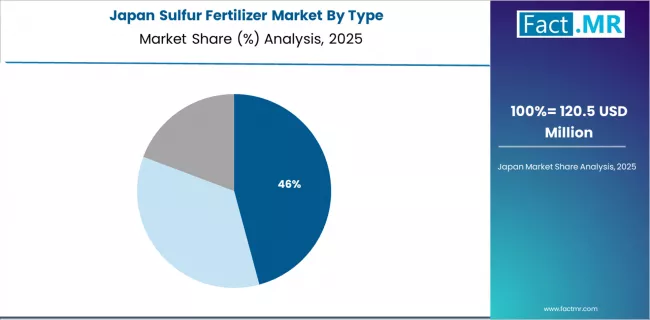
The Japanese sulfur fertilizer market demonstrates a mature and precision-focused landscape, characterized by advanced integration of elemental sulfur technologies with existing agricultural infrastructure across farming operations, crop nutrition networks, and operational systems. Japan's emphasis on quality excellence and operational precision drives demand for high-reliability sulfur fertilizer solutions that support comprehensive agricultural initiatives and regulatory requirements in crop nutrition operations.
The market benefits from strong partnerships between international fertilizer providers like Yara, Nutrien, and domestic agricultural leaders, including established farming operations and agricultural companies, creating comprehensive service ecosystems that prioritize operational quality and agricultural precision programs. Agricultural centers in major operational regions showcase advanced sulfur fertilizer implementations where crop nutrition systems achieve operational improvements through integrated agricultural programs.
Row Crops Applications Lead Agricultural Services in South Korea
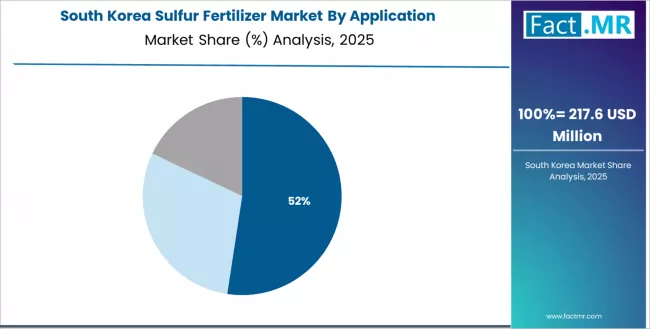
The South Korean sulfur fertilizer market is characterized by strong international row crops application presence, with companies like Mosaic, EuroChem, and ICL maintaining dominant positions through comprehensive system integration and operational services capabilities for agricultural modernization and fertilizer applications. The market is demonstrating a growing emphasis on localized operational support and rapid deployment capabilities, as Korean agricultural operators increasingly demand customized solutions that integrate with domestic farming infrastructure and advanced fertilizer systems deployed across major agricultural centers and operational facilities.
Local agricultural companies and regional fertilizer integrators are gaining market share through strategic partnerships with global providers, offering specialized services including operational training programs and certification services for agricultural specialists. The competitive landscape shows increasing collaboration between multinational fertilizer companies and Korean agricultural specialists, creating hybrid service models that combine international agricultural expertise with local market knowledge and operational relationship management.
Competitive Landscape of the Sulfur Fertilizer Market
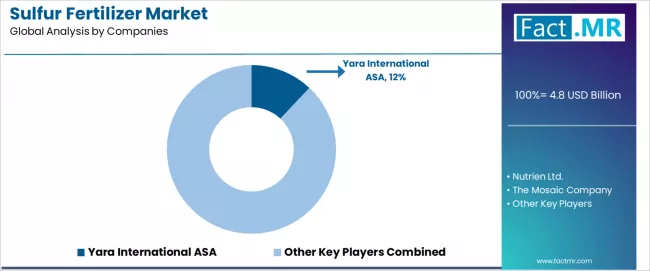
The sulfur fertilizer market is characterized by competition among established agricultural input manufacturers, specialized fertilizer producers, and diversified crop nutrition companies. Companies are investing in advanced fertilizer technology development, sustainable innovation, product portfolio expansion, and application-specific solution development to deliver high-performance, environmentally sustainable, and agriculturally effective sulfur fertilizer solutions. Innovation in precision application systems advancement, sustainable formulation integration, and advanced efficiency technologies is central to strengthening market position and competitive advantage.
Yara leads the market with a 12.0% share, offering comprehensive sulfur fertilizer solutions with a focus on crop nutrition reliability, advanced fertilizer systems, and integrated agricultural management platforms across diverse farming operation and agricultural distribution channels.
The company has announced major technology advancement initiatives and investments in precision agriculture and sustainability technologies to support growing global demand for advanced fertilizer products and effective crop nutrition capabilities.
Other key players including Nutrien provide innovative agricultural solutions with emphasis on crop nutrition excellence and sustainability technologies, while Mosaic delivers specialized fertilizer products with focus on advanced formulations and agricultural applications. EuroChem offers comprehensive crop nutrition solutions with sulfur fertilizer offerings for multiple agricultural categories, and ICL provides advanced fertilizer technologies with emphasis on specialty products and operational optimization. OCI, Helm AG, Sinofert, CF Industries, and SABIC contribute to market competition through specialized fertilizer capabilities and agricultural input expertise.
Sulfur Fertilizer Market - Stakeholder Contribution Framework
Sulfur fertilizers represent a specialized crop nutrition segment within agricultural and farming applications, projected to grow from USD 4.8 billion in 2025 to USD 6.6 billion by 2035 at a 3.2% CAGR.
These crop nutrition products—primarily elemental sulfur, sulfate fertilizers, and sulfur-coated urea & specialty configurations for multiple applications—serve as critical agricultural tools in row crops, horticulture & specialty crops, turf & ornamentals, and agricultural service centers where crop productivity, soil health, and operational efficiency are essential.
Market expansion is driven by increasing sulfur deficiency awareness, growing fertilizer adoption, expanding agricultural development, and rising demand for advanced crop nutrition solutions across diverse agricultural, farming, horticultural, and specialty sectors.
How Agricultural Regulators Could Strengthen Fertilizer Standards and Crop Nutrition Safety?
- Fertilizer Standards: Establish comprehensive technical specifications for sulfur fertilizers, including safety requirements, performance standards, application validation protocols, and quality guidelines that ensure consistent performance across farming operations, agricultural regions, crop production systems, and agricultural applications.
- Crop Safety Integration: Develop regulatory frameworks that incentivize advanced agricultural technology practices, requiring manufacturers to implement quality management systems, utilize application validation protocols, incorporate safety procedures, and achieve measurable sustainability improvements in sulfur fertilizer development.
- Quality Assurance Requirements: Implement mandatory quality control standards for sulfur fertilizer manufacturing, including effectiveness testing protocols, environmental verification measures, and performance validation systems that ensure product effectiveness and agricultural safety across diverse crop nutrition applications.
- Agricultural Grade Guidelines: Create specialized regulations for agricultural-grade sulfur fertilizers used in commercial operations, addressing stringent safety specifications, application requirements, and regulatory validation specific to fertilizer applications requiring enhanced effectiveness and environmental protection.
- Innovation Support Programs: Provide regulatory facilitation and research incentives for development of next-generation agricultural technologies that improve crop outcomes, enhance sustainability, and enable emerging applications in precision agriculture and sustainable farming.
How Industry Associations Could Advance Agricultural Technology Standards and Market Development?
- Agricultural Best Practices: Develop comprehensive technical guidelines for sulfur fertilizer selection, application optimization, and performance validation techniques that maximize agricultural effectiveness, ensure crop safety, and maintain cost-effectiveness across farming operations, agricultural regions, and fertilizer applications.
- Sustainability Benchmarking: Establish industry-wide metrics for agricultural performance, including environmental assessment, crop nutrition measurement, operational outcome evaluation, and agricultural application documentation that enable comparative analysis and drive continuous improvement toward agricultural optimization objectives.
- Professional Training Programs: Create specialized education initiatives for agricultural technicians, fertilizer applicators, and farming professionals covering sulfur fertilizer characteristics, application methods, sustainability requirements, and technical procedures across diverse agricultural applications.
- Application Standardization: Develop standardized testing methodologies for sulfur fertilizer evaluation, including effectiveness assessment, environmental analysis, operational validation, and application-specific performance metrics that facilitate objective product comparison and application validation.
- Agricultural Collaboration: Facilitate partnerships between sulfur fertilizer suppliers, farming operations, research institutions, and agricultural organizations to advance fertilizer technology development, address emerging agricultural challenges, and accelerate innovation in crop nutrition and farming applications.
How Sulfur Fertilizer Manufacturers Could Drive Innovation and Market Leadership?
- Advanced Agricultural Technologies: Invest in fertilizer formulation enhancement, precision application integration, operational optimization, and sustainability improvement initiatives that enhance agricultural effectiveness while maintaining reliability and regulatory compliance in global markets.
- Specialized Product Development: Develop specialized sulfur fertilizers with enhanced agricultural characteristics, including optimized crop nutrition, improved application efficiency, increased sustainability, and application-specific performance attributes for emerging agricultural segments.
- Agricultural Quality Integration: Implement intelligent quality control systems with real-time performance monitoring, predictive application assessment, automated effectiveness verification, and data analytics that optimize product performance, ensure agricultural reliability, and reduce operational complexity.
- Agricultural Support Services: Establish comprehensive customer service capabilities providing technical consultation, training assistance, application troubleshooting, and agricultural expertise that strengthen customer relationships and enable successful farming implementation.
- Global Agricultural Excellence: Develop regional service networks, specialized agricultural support management, reliable technical support systems, and responsive customer service that ensure consistent product availability, maintain agricultural quality, and support customer farming requirements worldwide.
How End-User Industries Could Optimize Agricultural Performance and Farming Success?
- Strategic Product Selection: Conduct comprehensive assessments of agricultural requirements, crop nutrition needs, regulatory constraints, and operational considerations to optimize sulfur fertilizer selection and achieve desired agricultural characteristics while managing total farming costs and operational outcomes.
- Agricultural Workflow Optimization: Implement advanced agricultural methodologies utilizing performance validation, outcome evaluation, and systematic performance assessment to maximize sulfur fertilizer agricultural benefits, minimize operational complexity, and optimize overall farming effectiveness and operational satisfaction.
- Sustainability Management: Develop optimized agricultural protocols, environmental control procedures, and outcome validation that ensure effective sulfur fertilizer utilization, maximize agricultural benefits, and maintain consistent agricultural performance throughout farming operations.
- Quality Agriculture Integration: Incorporate agricultural best practices, sustainability principles, and farming quality considerations into operational planning and fertilizer application processes that support comprehensive agricultural objectives and operational excellence.
- Strategic Agricultural Partnerships: Establish strategic partnerships with sulfur fertilizer suppliers for joint agricultural programs, performance optimization initiatives, and co-innovation projects that address specific farming challenges and accelerate agricultural technology commercialization.
How Research Institutions Could Enable Agricultural Technology Advancement?
- Agricultural Research Programs: Conduct fundamental investigations into sulfur fertilizer technology, crop nutrition mechanisms, performance optimization, and agricultural applications that advance farming understanding and enable breakthrough innovations in fertilizer technology and agricultural science.
- Agricultural Technology Development: Develop novel application methods, including advanced application techniques, precision approaches, and performance enhancement technologies that improve agricultural performance while maintaining sustainability and cost effectiveness.
- Farming Application Innovation: Investigate emerging applications for sulfur fertilizers in precision agriculture, sustainable procedures, smart farming, and specialized operational applications that create new market opportunities and expand agricultural potential.
- Agricultural Validation Services: Provide advanced agricultural research services utilizing performance validation, application testing, farming assessment, and operational evaluation methodologies that enable detailed understanding of sulfur fertilizer properties and agricultural applications.
- Agricultural Technology Transfer: Facilitate technology commercialization through licensing agreements, startup incubation programs, agricultural publications, and collaborative research projects that accelerate fertilizer technology innovation adoption and strengthen industry-academia partnerships.
How Investors and Financial Enablers Could Support Agricultural Technology Market Growth?
- Agricultural Infrastructure Investment: Provide capital for sulfur fertilizer manufacturing facility construction, production capacity expansion, and technology upgrade projects that address growing agricultural demand while improving application efficiency and performance.
- Agricultural Innovation Financing: Fund research and development of breakthrough sulfur fertilizer technologies, including advanced application methods, precision systems, and novel agricultural applications that address current market limitations and create competitive advantages.
- Application Development Support: Finance agricultural technology innovation initiatives, application validation programs, regulatory development, and farming advancement that enhance agricultural capabilities and position manufacturers for long-term market acceptance and growth.
- Agricultural Market Expansion: Support strategic acquisitions, market entry initiatives, distribution network development, and customer agricultural service capabilities that accelerate geographic expansion and strengthen competitive positions in high-growth agricultural markets.
- Global Agricultural Development: Provide financing and technical assistance for sulfur fertilizer facilities in developing economies, creating new fertilizer technology supply capabilities, supporting local agricultural development, and expanding global market access for agricultural solutions.
Key Players in the Sulfur Fertilizer Market
- Yara International ASA
- Nutrien Ltd.
- The Mosaic Company
- EuroChem Group AG
- ICL Group Ltd.
- OCI N.V.
- Helm AG
- Sinofert Holdings Limited
- CF Industries Holdings, Inc.
- Saudi Basic Industries Corporation (SABIC)
Scope of the Report
| Items | Values |
|---|---|
| Quantitative Units (2025) | USD 4.8 Billion |
| Type | Elemental sulfur, Sulfate fertilizers, Sulfur-coated urea & specialty |
| Application | Row crops, Horticulture & specialty crops, Turf & ornamentals |
| Form | Solid/granular, Liquid solutions, Coated/slow-release |
| Regions Covered | North America, Europe, Asia Pacific, Latin America, Middle East & Africa |
| Countries Covered | USA, Germany, France, UK, Japan, South Korea, Mexico, and 40+ countries |
| Key Companies Profiled | Yara, Nutrien, Mosaic, EuroChem, ICL, OCI |
| Additional Attributes | Dollar sales by type and application category, regional demand trends, competitive landscape, technological advancements in agricultural production, fertilizer development, crop nutrition innovation, and operational performance optimization |
Sulfur Fertilizer Market by Segments
-
Type :
- Elemental Sulfur
- Sulfate fertilizers (e.g., ammonium sulfate)
- Sulfur-coated Urea & Specialty
-
Application :
- Row Crops
- Horticulture & Specialty Crops
- Turf & Ornamentals
-
Form :
- Solid/Granular
- Liquid Solutions
- Coated/Slow-release
-
Region :
-
North America
- United States
- Canada
- Mexico
-
Europe
- Germany
- United Kingdom
- France
- Italy
- Spain
- Netherlands
- Nordic
- BENELUX
- Rest of Europe
-
Asia Pacific
- China
- Japan
- South Korea
- Taiwan
- Australia
- Rest of Asia Pacific
-
Latin America
- Brazil
- Argentina
- Chile
- Rest of Latin America
-
Middle East & Africa
- Kingdom of Saudi Arabia
- Other GCC Countries
- Turkey
- South Africa
- Other African Union
- Rest of Middle East & Africa
-
Eastern Europe
- Russia
- Poland
- Czech Republic
- Rest of Eastern Europe
-
Table of Content
- Executive Summary
- Global Market Outlook
- Demand to side Trends
- Supply to side Trends
- Technology Roadmap Analysis
- Analysis and Recommendations
- Market Overview
- Market Coverage / Taxonomy
- Market Definition / Scope / Limitations
- Market Background
- Market Dynamics
- Drivers
- Restraints
- Opportunity
- Trends
- Scenario Forecast
- Demand in Optimistic Scenario
- Demand in Likely Scenario
- Demand in Conservative Scenario
- Opportunity Map Analysis
- Product Life Cycle Analysis
- Supply Chain Analysis
- Investment Feasibility Matrix
- Value Chain Analysis
- PESTLE and Porter’s Analysis
- Regulatory Landscape
- Regional Parent Market Outlook
- Production and Consumption Statistics
- Import and Export Statistics
- Market Dynamics
- Global Market Analysis 2020 to 2024 and Forecast, 2025 to 2035
- Historical Market Size Value (USD Million) Analysis, 2020 to 2024
- Current and Future Market Size Value (USD Million) Projections, 2025 to 2035
- Y to o to Y Growth Trend Analysis
- Absolute $ Opportunity Analysis
- Global Market Pricing Analysis 2020 to 2024 and Forecast 2025 to 2035
- Global Market Analysis 2020 to 2024 and Forecast 2025 to 2035, By Type
- Introduction / Key Findings
- Historical Market Size Value (USD Million) Analysis By Type , 2020 to 2024
- Current and Future Market Size Value (USD Million) Analysis and Forecast By Type , 2025 to 2035
- Elemental Sulfur
- Sulfate fertilizers (e.g., ammonium sulfate)
- Sulfur-coated Urea & Specialty
- Y to o to Y Growth Trend Analysis By Type , 2020 to 2024
- Absolute $ Opportunity Analysis By Type , 2025 to 2035
- Global Market Analysis 2020 to 2024 and Forecast 2025 to 2035, By Application
- Introduction / Key Findings
- Historical Market Size Value (USD Million) Analysis By Application, 2020 to 2024
- Current and Future Market Size Value (USD Million) Analysis and Forecast By Application, 2025 to 2035
- Row Crops
- Horticulture & Specialty Crops
- Turf & Ornamentals
- Y to o to Y Growth Trend Analysis By Application, 2020 to 2024
- Absolute $ Opportunity Analysis By Application, 2025 to 2035
- Global Market Analysis 2020 to 2024 and Forecast 2025 to 2035, By Form
- Introduction / Key Findings
- Historical Market Size Value (USD Million) Analysis By Form, 2020 to 2024
- Current and Future Market Size Value (USD Million) Analysis and Forecast By Form, 2025 to 2035
- Solid/Granular
- Liquid Solutions
- Coated/Slow-release
- Y to o to Y Growth Trend Analysis By Form, 2020 to 2024
- Absolute $ Opportunity Analysis By Form, 2025 to 2035
- Global Market Analysis 2020 to 2024 and Forecast 2025 to 2035, By Region
- Introduction
- Historical Market Size Value (USD Million) Analysis By Region, 2020 to 2024
- Current Market Size Value (USD Million) Analysis and Forecast By Region, 2025 to 2035
- North America
- Latin America
- Western Europe
- Eastern Europe
- East Asia
- South Asia and Pacific
- Middle East & Africa
- Market Attractiveness Analysis By Region
- North America Market Analysis 2020 to 2024 and Forecast 2025 to 2035, By Country
- Historical Market Size Value (USD Million) Trend Analysis By Market Taxonomy, 2020 to 2024
- Market Size Value (USD Million) Forecast By Market Taxonomy, 2025 to 2035
- By Country
- USA
- Canada
- Mexico
- By Type
- By Application
- By Form
- By Country
- Market Attractiveness Analysis
- By Country
- By Type
- By Application
- By Form
- Key Takeaways
- Latin America Market Analysis 2020 to 2024 and Forecast 2025 to 2035, By Country
- Historical Market Size Value (USD Million) Trend Analysis By Market Taxonomy, 2020 to 2024
- Market Size Value (USD Million) Forecast By Market Taxonomy, 2025 to 2035
- By Country
- Brazil
- Chile
- Rest of Latin America
- By Type
- By Application
- By Form
- By Country
- Market Attractiveness Analysis
- By Country
- By Type
- By Application
- By Form
- Key Takeaways
- Western Europe Market Analysis 2020 to 2024 and Forecast 2025 to 2035, By Country
- Historical Market Size Value (USD Million) Trend Analysis By Market Taxonomy, 2020 to 2024
- Market Size Value (USD Million) Forecast By Market Taxonomy, 2025 to 2035
- By Country
- Germany
- UK
- Italy
- Spain
- France
- Nordic
- BENELUX
- Rest of Western Europe
- By Type
- By Application
- By Form
- By Country
- Market Attractiveness Analysis
- By Country
- By Type
- By Application
- By Form
- Key Takeaways
- Eastern Europe Market Analysis 2020 to 2024 and Forecast 2025 to 2035, By Country
- Historical Market Size Value (USD Million) Trend Analysis By Market Taxonomy, 2020 to 2024
- Market Size Value (USD Million) Forecast By Market Taxonomy, 2025 to 2035
- By Country
- Russia
- Poland
- Hungary
- Balkan & Baltic
- Rest of Eastern Europe
- By Type
- By Application
- By Form
- By Country
- Market Attractiveness Analysis
- By Country
- By Type
- By Application
- By Form
- Key Takeaways
- East Asia Market Analysis 2020 to 2024 and Forecast 2025 to 2035, By Country
- Historical Market Size Value (USD Million) Trend Analysis By Market Taxonomy, 2020 to 2024
- Market Size Value (USD Million) Forecast By Market Taxonomy, 2025 to 2035
- By Country
- China
- Japan
- South Korea
- By Type
- By Application
- By Form
- By Country
- Market Attractiveness Analysis
- By Country
- By Type
- By Application
- By Form
- Key Takeaways
- South Asia and Pacific Market Analysis 2020 to 2024 and Forecast 2025 to 2035, By Country
- Historical Market Size Value (USD Million) Trend Analysis By Market Taxonomy, 2020 to 2024
- Market Size Value (USD Million) Forecast By Market Taxonomy, 2025 to 2035
- By Country
- India
- ASEAN
- Australia & New Zealand
- Rest of South Asia and Pacific
- By Type
- By Application
- By Form
- By Country
- Market Attractiveness Analysis
- By Country
- By Type
- By Application
- By Form
- Key Takeaways
- Middle East & Africa Market Analysis 2020 to 2024 and Forecast 2025 to 2035, By Country
- Historical Market Size Value (USD Million) Trend Analysis By Market Taxonomy, 2020 to 2024
- Market Size Value (USD Million) Forecast By Market Taxonomy, 2025 to 2035
- By Country
- Kingdom of Saudi Arabia
- Other GCC Countries
- Turkiye
- South Africa
- Other African Union
- Rest of Middle East & Africa
- By Type
- By Application
- By Form
- By Country
- Market Attractiveness Analysis
- By Country
- By Type
- By Application
- By Form
- Key Takeaways
- Key Countries Market Analysis
- USA
- Pricing Analysis
- Market Share Analysis, 2024
- By Type
- By Application
- By Form
- Canada
- Pricing Analysis
- Market Share Analysis, 2024
- By Type
- By Application
- By Form
- Mexico
- Pricing Analysis
- Market Share Analysis, 2024
- By Type
- By Application
- By Form
- Brazil
- Pricing Analysis
- Market Share Analysis, 2024
- By Type
- By Application
- By Form
- Chile
- Pricing Analysis
- Market Share Analysis, 2024
- By Type
- By Application
- By Form
- Germany
- Pricing Analysis
- Market Share Analysis, 2024
- By Type
- By Application
- By Form
- UK
- Pricing Analysis
- Market Share Analysis, 2024
- By Type
- By Application
- By Form
- Italy
- Pricing Analysis
- Market Share Analysis, 2024
- By Type
- By Application
- By Form
- Spain
- Pricing Analysis
- Market Share Analysis, 2024
- By Type
- By Application
- By Form
- France
- Pricing Analysis
- Market Share Analysis, 2024
- By Type
- By Application
- By Form
- India
- Pricing Analysis
- Market Share Analysis, 2024
- By Type
- By Application
- By Form
- ASEAN
- Pricing Analysis
- Market Share Analysis, 2024
- By Type
- By Application
- By Form
- Australia & New Zealand
- Pricing Analysis
- Market Share Analysis, 2024
- By Type
- By Application
- By Form
- China
- Pricing Analysis
- Market Share Analysis, 2024
- By Type
- By Application
- By Form
- Japan
- Pricing Analysis
- Market Share Analysis, 2024
- By Type
- By Application
- By Form
- South Korea
- Pricing Analysis
- Market Share Analysis, 2024
- By Type
- By Application
- By Form
- Russia
- Pricing Analysis
- Market Share Analysis, 2024
- By Type
- By Application
- By Form
- Poland
- Pricing Analysis
- Market Share Analysis, 2024
- By Type
- By Application
- By Form
- Hungary
- Pricing Analysis
- Market Share Analysis, 2024
- By Type
- By Application
- By Form
- Kingdom of Saudi Arabia
- Pricing Analysis
- Market Share Analysis, 2024
- By Type
- By Application
- By Form
- Turkiye
- Pricing Analysis
- Market Share Analysis, 2024
- By Type
- By Application
- By Form
- South Africa
- Pricing Analysis
- Market Share Analysis, 2024
- By Type
- By Application
- By Form
- USA
- Market Structure Analysis
- Competition Dashboard
- Competition Benchmarking
- Market Share Analysis of Top Players
- By Regional
- By Type
- By Application
- By Form
- Competition Analysis
- Competition Deep Dive
- Yara International ASA
- Overview
- Product Portfolio
- Profitability by Market Segments (Product/Age /Sales Channel/Region)
- Sales Footprint
- Strategy Overview
- Marketing Strategy
- Product Strategy
- Channel Strategy
- Nutrien Ltd.
- The Mosaic Company
- EuroChem Group AG
- ICL Group Ltd.
- OCI N.V.
- Helm AG
- Sinofert Holdings Limited
- CF Industries Holdings, Inc.
- Saudi Basic Industries Corporation (SABIC)
- Yara International ASA
- Competition Deep Dive
- Assumptions & Acronyms Used
- Research Methodology
List Of Table
- Table 1: Global Market Value (USD Million) Forecast by Region, 2020 to 2035
- Table 2: Global Market Value (USD Million) Forecast by Type , 2020 to 2035
- Table 3: Global Market Value (USD Million) Forecast by Application, 2020 to 2035
- Table 4: Global Market Value (USD Million) Forecast by Form, 2020 to 2035
- Table 5: North America Market Value (USD Million) Forecast by Country, 2020 to 2035
- Table 6: North America Market Value (USD Million) Forecast by Type , 2020 to 2035
- Table 7: North America Market Value (USD Million) Forecast by Application, 2020 to 2035
- Table 8: North America Market Value (USD Million) Forecast by Form, 2020 to 2035
- Table 9: Latin America Market Value (USD Million) Forecast by Country, 2020 to 2035
- Table 10: Latin America Market Value (USD Million) Forecast by Type , 2020 to 2035
- Table 11: Latin America Market Value (USD Million) Forecast by Application, 2020 to 2035
- Table 12: Latin America Market Value (USD Million) Forecast by Form, 2020 to 2035
- Table 13: Western Europe Market Value (USD Million) Forecast by Country, 2020 to 2035
- Table 14: Western Europe Market Value (USD Million) Forecast by Type , 2020 to 2035
- Table 15: Western Europe Market Value (USD Million) Forecast by Application, 2020 to 2035
- Table 16: Western Europe Market Value (USD Million) Forecast by Form, 2020 to 2035
- Table 17: Eastern Europe Market Value (USD Million) Forecast by Country, 2020 to 2035
- Table 18: Eastern Europe Market Value (USD Million) Forecast by Type , 2020 to 2035
- Table 19: Eastern Europe Market Value (USD Million) Forecast by Application, 2020 to 2035
- Table 20: Eastern Europe Market Value (USD Million) Forecast by Form, 2020 to 2035
- Table 21: East Asia Market Value (USD Million) Forecast by Country, 2020 to 2035
- Table 22: East Asia Market Value (USD Million) Forecast by Type , 2020 to 2035
- Table 23: East Asia Market Value (USD Million) Forecast by Application, 2020 to 2035
- Table 24: East Asia Market Value (USD Million) Forecast by Form, 2020 to 2035
- Table 25: South Asia and Pacific Market Value (USD Million) Forecast by Country, 2020 to 2035
- Table 26: South Asia and Pacific Market Value (USD Million) Forecast by Type , 2020 to 2035
- Table 27: South Asia and Pacific Market Value (USD Million) Forecast by Application, 2020 to 2035
- Table 28: South Asia and Pacific Market Value (USD Million) Forecast by Form, 2020 to 2035
- Table 29: Middle East & Africa Market Value (USD Million) Forecast by Country, 2020 to 2035
- Table 30: Middle East & Africa Market Value (USD Million) Forecast by Type , 2020 to 2035
- Table 31: Middle East & Africa Market Value (USD Million) Forecast by Application, 2020 to 2035
- Table 32: Middle East & Africa Market Value (USD Million) Forecast by Form, 2020 to 2035
List Of Figures
- Figure 1: Global Market Pricing Analysis
- Figure 2: Global Market Value (USD Million) Forecast 2020-2035
- Figure 3: Global Market Value Share and BPS Analysis by Type , 2025 and 2035
- Figure 4: Global Market Y to o to Y Growth Comparison by Type , 2025-2035
- Figure 5: Global Market Attractiveness Analysis by Type
- Figure 6: Global Market Value Share and BPS Analysis by Application, 2025 and 2035
- Figure 7: Global Market Y to o to Y Growth Comparison by Application, 2025-2035
- Figure 8: Global Market Attractiveness Analysis by Application
- Figure 9: Global Market Value Share and BPS Analysis by Form, 2025 and 2035
- Figure 10: Global Market Y to o to Y Growth Comparison by Form, 2025-2035
- Figure 11: Global Market Attractiveness Analysis by Form
- Figure 12: Global Market Value (USD Million) Share and BPS Analysis by Region, 2025 and 2035
- Figure 13: Global Market Y to o to Y Growth Comparison by Region, 2025-2035
- Figure 14: Global Market Attractiveness Analysis by Region
- Figure 15: North America Market Incremental Dollar Opportunity, 2025-2035
- Figure 16: Latin America Market Incremental Dollar Opportunity, 2025-2035
- Figure 17: Western Europe Market Incremental Dollar Opportunity, 2025-2035
- Figure 18: Eastern Europe Market Incremental Dollar Opportunity, 2025-2035
- Figure 19: East Asia Market Incremental Dollar Opportunity, 2025-2035
- Figure 20: South Asia and Pacific Market Incremental Dollar Opportunity, 2025-2035
- Figure 21: Middle East & Africa Market Incremental Dollar Opportunity, 2025-2035
- Figure 22: North America Market Value Share and BPS Analysis by Country, 2025 and 2035
- Figure 23: North America Market Value Share and BPS Analysis by Type , 2025 and 2035
- Figure 24: North America Market Y to o to Y Growth Comparison by Type , 2025-2035
- Figure 25: North America Market Attractiveness Analysis by Type
- Figure 26: North America Market Value Share and BPS Analysis by Application, 2025 and 2035
- Figure 27: North America Market Y to o to Y Growth Comparison by Application, 2025-2035
- Figure 28: North America Market Attractiveness Analysis by Application
- Figure 29: North America Market Value Share and BPS Analysis by Form, 2025 and 2035
- Figure 30: North America Market Y to o to Y Growth Comparison by Form, 2025-2035
- Figure 31: North America Market Attractiveness Analysis by Form
- Figure 32: Latin America Market Value Share and BPS Analysis by Country, 2025 and 2035
- Figure 33: Latin America Market Value Share and BPS Analysis by Type , 2025 and 2035
- Figure 34: Latin America Market Y to o to Y Growth Comparison by Type , 2025-2035
- Figure 35: Latin America Market Attractiveness Analysis by Type
- Figure 36: Latin America Market Value Share and BPS Analysis by Application, 2025 and 2035
- Figure 37: Latin America Market Y to o to Y Growth Comparison by Application, 2025-2035
- Figure 38: Latin America Market Attractiveness Analysis by Application
- Figure 39: Latin America Market Value Share and BPS Analysis by Form, 2025 and 2035
- Figure 40: Latin America Market Y to o to Y Growth Comparison by Form, 2025-2035
- Figure 41: Latin America Market Attractiveness Analysis by Form
- Figure 42: Western Europe Market Value Share and BPS Analysis by Country, 2025 and 2035
- Figure 43: Western Europe Market Value Share and BPS Analysis by Type , 2025 and 2035
- Figure 44: Western Europe Market Y to o to Y Growth Comparison by Type , 2025-2035
- Figure 45: Western Europe Market Attractiveness Analysis by Type
- Figure 46: Western Europe Market Value Share and BPS Analysis by Application, 2025 and 2035
- Figure 47: Western Europe Market Y to o to Y Growth Comparison by Application, 2025-2035
- Figure 48: Western Europe Market Attractiveness Analysis by Application
- Figure 49: Western Europe Market Value Share and BPS Analysis by Form, 2025 and 2035
- Figure 50: Western Europe Market Y to o to Y Growth Comparison by Form, 2025-2035
- Figure 51: Western Europe Market Attractiveness Analysis by Form
- Figure 52: Eastern Europe Market Value Share and BPS Analysis by Country, 2025 and 2035
- Figure 53: Eastern Europe Market Value Share and BPS Analysis by Type , 2025 and 2035
- Figure 54: Eastern Europe Market Y to o to Y Growth Comparison by Type , 2025-2035
- Figure 55: Eastern Europe Market Attractiveness Analysis by Type
- Figure 56: Eastern Europe Market Value Share and BPS Analysis by Application, 2025 and 2035
- Figure 57: Eastern Europe Market Y to o to Y Growth Comparison by Application, 2025-2035
- Figure 58: Eastern Europe Market Attractiveness Analysis by Application
- Figure 59: Eastern Europe Market Value Share and BPS Analysis by Form, 2025 and 2035
- Figure 60: Eastern Europe Market Y to o to Y Growth Comparison by Form, 2025-2035
- Figure 61: Eastern Europe Market Attractiveness Analysis by Form
- Figure 62: East Asia Market Value Share and BPS Analysis by Country, 2025 and 2035
- Figure 63: East Asia Market Value Share and BPS Analysis by Type , 2025 and 2035
- Figure 64: East Asia Market Y to o to Y Growth Comparison by Type , 2025-2035
- Figure 65: East Asia Market Attractiveness Analysis by Type
- Figure 66: East Asia Market Value Share and BPS Analysis by Application, 2025 and 2035
- Figure 67: East Asia Market Y to o to Y Growth Comparison by Application, 2025-2035
- Figure 68: East Asia Market Attractiveness Analysis by Application
- Figure 69: East Asia Market Value Share and BPS Analysis by Form, 2025 and 2035
- Figure 70: East Asia Market Y to o to Y Growth Comparison by Form, 2025-2035
- Figure 71: East Asia Market Attractiveness Analysis by Form
- Figure 72: South Asia and Pacific Market Value Share and BPS Analysis by Country, 2025 and 2035
- Figure 73: South Asia and Pacific Market Value Share and BPS Analysis by Type , 2025 and 2035
- Figure 74: South Asia and Pacific Market Y to o to Y Growth Comparison by Type , 2025-2035
- Figure 75: South Asia and Pacific Market Attractiveness Analysis by Type
- Figure 76: South Asia and Pacific Market Value Share and BPS Analysis by Application, 2025 and 2035
- Figure 77: South Asia and Pacific Market Y to o to Y Growth Comparison by Application, 2025-2035
- Figure 78: South Asia and Pacific Market Attractiveness Analysis by Application
- Figure 79: South Asia and Pacific Market Value Share and BPS Analysis by Form, 2025 and 2035
- Figure 80: South Asia and Pacific Market Y to o to Y Growth Comparison by Form, 2025-2035
- Figure 81: South Asia and Pacific Market Attractiveness Analysis by Form
- Figure 82: Middle East & Africa Market Value Share and BPS Analysis by Country, 2025 and 2035
- Figure 83: Middle East & Africa Market Value Share and BPS Analysis by Type , 2025 and 2035
- Figure 84: Middle East & Africa Market Y to o to Y Growth Comparison by Type , 2025-2035
- Figure 85: Middle East & Africa Market Attractiveness Analysis by Type
- Figure 86: Middle East & Africa Market Value Share and BPS Analysis by Application, 2025 and 2035
- Figure 87: Middle East & Africa Market Y to o to Y Growth Comparison by Application, 2025-2035
- Figure 88: Middle East & Africa Market Attractiveness Analysis by Application
- Figure 89: Middle East & Africa Market Value Share and BPS Analysis by Form, 2025 and 2035
- Figure 90: Middle East & Africa Market Y to o to Y Growth Comparison by Form, 2025-2035
- Figure 91: Middle East & Africa Market Attractiveness Analysis by Form
- Figure 92: Global Market - Tier Structure Analysis
- Figure 93: Global Market - Company Share Analysis
- FAQs -
How big is the sulfur fertilizer market in 2025?
The global sulfur fertilizer market is estimated to be valued at USD 4.8 billion in 2025.
What will be the size of sulfur fertilizer market in 2035?
The market size for the sulfur fertilizer market is projected to reach USD 6.6 billion by 2035.
How much will be the sulfur fertilizer market growth between 2025 and 2035?
The sulfur fertilizer market is expected to grow at a 3.2% CAGR between 2025 and 2035.
What are the key product types in the sulfur fertilizer market?
The key product types in sulfur fertilizer market are elemental sulfur, sulfate fertilizers (e.g., ammonium sulfate) and sulfur-coated urea & specialty.
Which application segment to contribute significant share in the sulfur fertilizer market in 2025?
In terms of application, row crops segment to command 51.0% share in the sulfur fertilizer market in 2025.